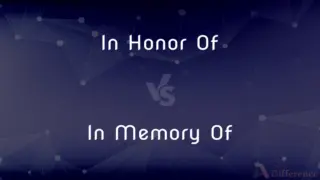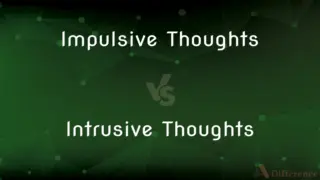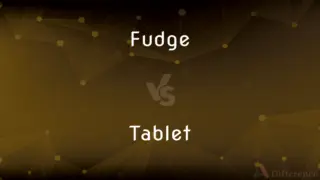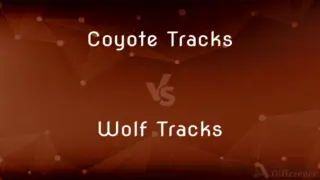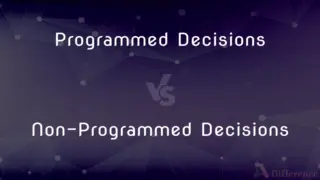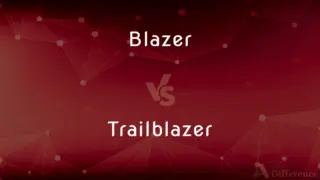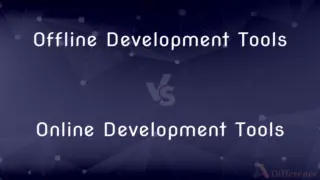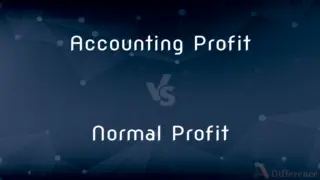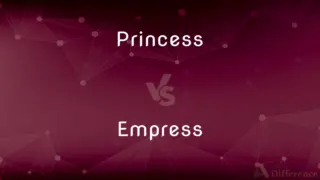Chase vs. Trace — What's the Difference?
Edited by Tayyaba Rehman — By Fiza Rafique — Updated on March 6, 2024
Chase involves actively pursuing someone or something, often to catch or obtain it, while trace means to find or discover something by investigation or searching for evidence.

Difference Between Chase and Trace
Table of Contents
ADVERTISEMENT
Key Differences
Chase typically implies a physical or metaphorical pursuit, where one is trying to catch up to or capture something or someone. It often involves movement and direct action. On the other hand, trace is more about following the evidence or clues to uncover something hidden or not immediately obvious, requiring analytical or investigative skills rather than physical effort.
Chase is used in contexts of pursuit, such as in sports, law enforcement, or even in playful or competitive scenarios. It suggests a dynamic and active process. Whereas trace is often used in research, detective work, or historical studies, indicating a methodical, careful process of piecing together information.
When someone chases, the focus is on the immediate goal of catching or reaching the target, driven by urgency or desire. In contrast, tracing often requires patience and persistence, as the process can be slow and painstaking, with the focus on the journey of discovery rather than just the end result.
Chase can involve direct confrontation or interaction with the target, emphasizing a physical or visible connection. Meanwhile, trace might not involve direct interaction with the subject of the search, as it can be conducted through secondary sources or indirect evidence.
Chase is associated with energy, speed, and sometimes excitement or danger, highlighting the physical aspects of pursuit. Trace, however, is associated with thoughtfulness, method, and precision, emphasizing the intellectual pursuit of knowledge or truth.
ADVERTISEMENT
Comparison Chart
Definition
Pursuing something to catch or obtain it
Searching or finding by investigation
Context
Physical or metaphorical pursuit
Research, detective work, historical study
Focus
Immediate goal of catching/reaching target
Process of discovery
Interaction
Direct, often physical
Indirect, through evidence or clues
Associated Characteristics
Energy, speed, excitement
Thoughtfulness, method, precision
Compare with Definitions
Chase
To follow or pursue in order to catch or attack.
The police officer had to chase the thief through the crowded streets.
Trace
To outline or delineate a path or series of events.
The historian traced the rise and fall of the empire.
Chase
To pursue in order to reach or achieve something.
He's been chasing his dream of becoming a pilot for years.
Trace
To copy a drawing, map, or design on a transparent or semi-transparent surface.
She traced the outline of the painting onto her canvas.
Chase
In sports, to attempt to catch up or overcome a deficit.
The team was chasing a two-goal deficit with only ten minutes left.
Trace
To find or discover by careful investigation or follow-up.
Detectives were able to trace the phone call to a location downtown.
Chase
To drive or force into a specified state or path.
The storm chased us back home earlier than planned.
Trace
To establish the origin or derivation of something.
Linguists can trace the origins of some English words to Latin and Greek.
Chase
To seek or pursue with intent to capture.
The cat will often chase its own tail in circles.
Trace
To make one's way or move along a path or route.
The hiker traced the mountain trail up to the peak.
Chase
Pursue in order to catch or catch up with
The dog chased after the stick
Police chased the stolen car through the city
Trace
Find or discover by investigation
Police are trying to trace a white van seen in the area
Chase
Drive or cause to go in a specified direction
She chased him out of the house
Trace
Copy (a drawing, map, or design) by drawing over its lines on a superimposed piece of transparent paper
Trace a map of the world on to a large piece of paper
Chase
Try to obtain (something owed or required)
The company employs people to chase up debts
Trace
A mark, object, or other indication of the existence or passing of something
Remove all traces of the old adhesive
The aircraft disappeared without trace
Chase
To put to flight; drive
She chased the rabbits from the garden.
Trace
To discover or determine by searching or researching evidence
Trace the cause of a disease.
Chase
(Informal) To go hurriedly; rush
Chased all over looking for us.
Trace
To locate or ascertain the origin of
Traced the money to a foreign bank account.
Chase
The act of chasing; pursuit
The police arrested the driver after a wild chase.
Trace
An act of tracing.
Your cell phone company can put a trace on your line.
Chase
Go after with the intent to catch;
The policeman chased the mugger down the alley
The dog chased the rabbit
Trace
Pursue or chase relentlessly;
The hunters traced the deer into the woods
The detectives hounded the suspect until they found the him
Trace
Discover traces of;
She traced the circumstances of her birth
Trace
Make one's course or travel along a path; travel or pass over, around, or along;
The children traced along the edge of the drak forest
The women traced the pasture
Trace
Copy by following the lines of the original drawing on a transparent sheet placed upon it; make a tracing of;
Trace a design
Trace a pattern
Common Curiosities
Can chase be non-physical?
Yes, one can chase dreams or goals, which is metaphorically pursuing an achievement.
What is the primary difference between chase and trace?
Chase is about pursuing to catch or achieve, while trace is about outlining or following evidence/history.
Does chase imply success?
Not always; chase implies the act of pursuit, but not necessarily the success of capturing or achieving the goal.
Can both actions be part of the same process?
Yes, one might trace clues in an investigation and then chase a suspect based on those findings.
What does it mean to trace an idea back to its source?
It involves researching and understanding the origins and development of the idea through history.
Can tracing be considered an art form?
Yes, especially in contexts like tracing patterns in design or recreating artworks for study.
Is trace used only in investigations?
No, tracing is also used in art, design, and historical research, among other fields.
How does technology affect tracing activities?
Technology, such as GPS and digital archives, enhances the ability to trace movements and histories more accurately.
Is tracing always related to physical objects?
No, tracing can also involve conceptual paths, like tracing the origin of ideas.
Are chase scenes common in media?
Yes, chase scenes are a staple in action movies and literature, often adding excitement and tension.
Can animals chase or trace?
Animals can chase prey or competitors, but tracing, as it involves investigative or delineative processes, is generally a human activity.
What skills are important for a successful chase?
Speed, strategy, and endurance are key for physical chases, while determination and focus are important for metaphorical ones.
What role does patience play in tracing activities?
Patience is crucial for tracing, as it often involves detailed and meticulous work.
How do chases impact narratives in stories and films?
They introduce dynamic action, suspense, and the opportunity for character development through challenges.
How does one trace family history?
By using records, DNA testing, and historical documents to piece together genealogical information.
Share Your Discovery

Previous Comparison
Mime vs. Pantomime
Next Comparison
Campsite vs. CampAuthor Spotlight
Written by
Fiza RafiqueFiza Rafique is a skilled content writer at AskDifference.com, where she meticulously refines and enhances written pieces. Drawing from her vast editorial expertise, Fiza ensures clarity, accuracy, and precision in every article. Passionate about language, she continually seeks to elevate the quality of content for readers worldwide.
Edited by
Tayyaba RehmanTayyaba Rehman is a distinguished writer, currently serving as a primary contributor to askdifference.com. As a researcher in semantics and etymology, Tayyaba's passion for the complexity of languages and their distinctions has found a perfect home on the platform. Tayyaba delves into the intricacies of language, distinguishing between commonly confused words and phrases, thereby providing clarity for readers worldwide.














